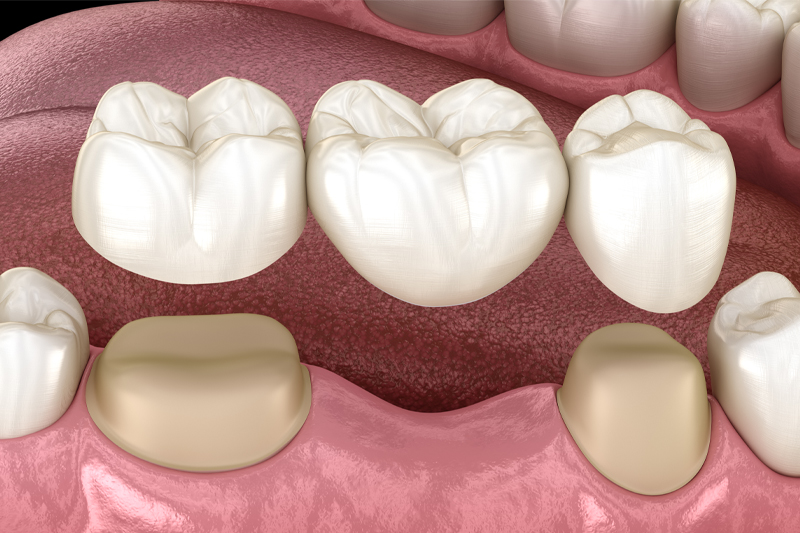Missing Multiple Teeth? Discover the Versatility of Dental Bridges
Tooth loss presents challenges as it impacts how you eat, speak, and the appearance of your smile. That’s why you should replace lost teeth quickly. Dental bridges from Ridgewood Dentistry make a practical and effective means of replacing one or multiple consecutive missing teeth. After evaluating your situation, your Ridgewood, New Jersey dentist, Dr. Warren Boardman, can determine if a dental bridge is a good replacement tooth option for you.
About Dental Bridges
If you’ve lost one or more teeth due to trauma, oral infection, or gum disease, Dr. Boardman may recommend replacing these teeth with a dental bridge. Bridges are a versatile dental procedure that offers numerous possibilities for replacing lost teeth.
A fixed dental bridge generally consists of prosthetic teeth held in place by dental crowns attached to adjacent natural teeth, which act as anchors to your bridge. Dental crowns can be used to anchor a single-tooth bridge or multiple-tooth bridge consisting of two to four teeth.
Another option would be an implant-supported bridge that is anchored in place using dental implants. Either way, you benefit from secure, stable replacement teeth that can give you years of quality use.
Why Choose a Dental Bridge
A quality dental bridge offers multiple benefits as a restorative treatment. Dr. Boardman can customize your bridge for comfort, performance, and a natural-looking appearance to help you get the most from your treatment. With a customized dental bridge, you can benefit from the following:
- Attractive prosthetics that complete your smile naturally
- Hardy prosthetics that can restore your ability to bite and chew
- Durable replacement teeth to fill the gap left by missing teeth to maintain your bite and tooth alignment
- Improved oral health and tooth functionality
- Greater confidence to smile, laugh, and eat in social settings
A dental bridge can resolve many of the problems associated with missing teeth by restoring your smile’s health, function, and appearance.
Dental Bridge Near Me in Ridgewood, New Jersey
To learn more about dental bridges or to schedule dental bridge treatment, contact Dr. Warren Boardman from Ridgewood Dentistry, Ridgewood, NJ, at (201) 448-8605.

While there are now many ways to replace a missing tooth, among the most common and predictable way is with a fixed, permanently cemented bridge for both aesthetic and functional reasons, it is important to replace any tooth that has been extracted in the presence of empty spaces. Teeth will shift and cause further dental problems. One way to replace a missing tooth is with a fixed bridge. During this procedure, your dentist will prepare the tooth on either side of the space for a cray. After the preparations are completed, an impression of the prepared teeth will be made and sent to the laboratory where the bridge will be fabricated. Your dentist will then make a temporary bridge to cover the preparations and the missing tooth. This will remain in the mouth until the final bridge is completed. At the next visit, the temporary bridge will be removed and the permanent bridge will be fitted. After approval of aesthetics and checking function, the fixed bridge will be permanently cemented.


